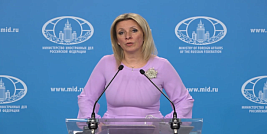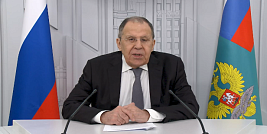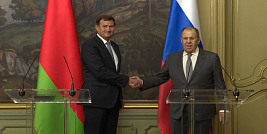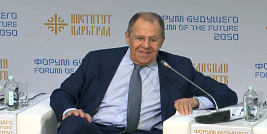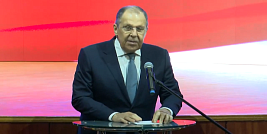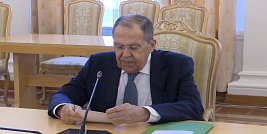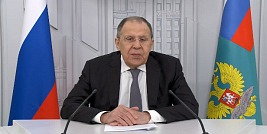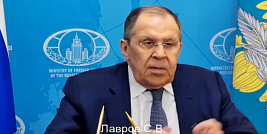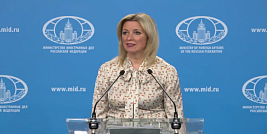Foreign Minister Sergey Lavrov’s remarks and answers to media questions at the news conference following Russia-India foreign and defence minister talks in the two-plus-two format, New Delhi, December 6, 2021
We completed the first part of our preparations for President of Russia Vladimir Putin’s visit to India and his talks with Prime Minister of India Narendra Modi.
I had a bilateral meeting with my Indian colleague, Minister of External Affairs Subrahmanyam Jaishankar. We discussed the main items on our agenda: the economy, hydrocarbons and energy, including nuclear power. We have promising and specific plans. We talked about holding a regular meeting of the Intergovernmental Commission on Trade, Economic, Scientific, Technical and Cultural Cooperation. Mr Jaishankar co-chairs this together with Deputy Prime Minister Yury Borisov. We discussed education and scientific exchanges and cultural ties. We have a fairly busy agenda.
A meeting of the Russian-Indian Intergovernmental Commission on Military and Military-Technical Cooperation took place in parallel with our talks. The participants held a useful, detailed discussion, and it will continue tomorrow. We talked about holding this meeting in the two-plus-two format; President of Russia Vladimir Putin and Prime Minister of India Narendra Modi had decided that the foreign and defence ministers of Russia and India should start and continue work in this format. In our common opinion, this initiative fully justifies itself. The participants had useful, meaningful discussions on various issues.
We focused on the situation in the Asia-Pacific Region. In the last few years elements of instability have increased which can undermine the universal, inclusive character of cooperation that was taking shape around ASEAN. We expressed our serious concern about US activities under the slogan of Indo-Pacific strategies. They are creating exclusive membership blocs there. The latest example is AUKUS, a military-technological alliance of the United States, Britain and Australia. There are many questions at this point, in part, in the context of plans to organise the production of nuclear-powered submarines with a nuclear plant in Australia or export them to that country. How does this conform to the standards of the IAEA and the Nuclear Weapons Non-Proliferation Treaty? In a more specific, regional context there is reason to wonder about the extent to which Australia would honour its commitments on a nuclear weapons-free zone in the South Pacific (1985 Rarotonga Treaty) if these plans materialised. The ASEAN countries announced another nuclear weapons free zone in the region (1997 Bangkok Treaty). It is necessary to find out how these efforts and commitments will correlate if the plans to supply Australia with nuclear-powered submarines come to fruition.
In connection with the situation in the APR, we covered other fast-developing associations (besides ASEAN), primarily the SCO, which has partnered with ASEAN and the EAEU. The prospects are good. We share its positive assessment to the effect that the SCO will continue to reinforce its status and increasingly play the role of a centre of cooperation. At the most recent SCO summit in Dushanbe in September, the process for the further expansion of the organisation was launched when Iran was invited to join as a full member. The SCO deals with issues of sustainable economic development and security. We highly appreciated India’s participation in the SCO anti-terrorist exercises Peace Mission 2021.
We talked about the Russia-India-China (RIC) consultation mechanism. Recently, the troika held a regular meeting via videoconference and approved a detailed document that was circulated at the UN.
BRICS is a broader group of states in which our partners from South Africa and Brazil interact with Russia, India and China. This format can also have a stabilising effect on this geopolitical space.
Afghanistan and Central Asia were discussed separately. We share a position with our Indian colleagues whereby the Taliban must keep its promise to ensure the inclusive ethnic and political nature of the new authority and to respect human rights, as well as to eradicate the terrorist and drug threat in Afghanistan and to prevent the spillover of instability to neighbouring countries. The Central Asian countries are our prime concern. Once again, we clearly reaffirmed the position that President Vladimir Putin has stated more than once: we are strongly against the attempts by the United States and other NATO countries to relocate some of their military infrastructure and armed forces, which hastily ended their mission in Afghanistan without fulfilling any goals (which they set for themselves), to neighbouring countries. Our Central Asian allies and partners have said this is unacceptable. By the same token, they do not find suitable the attempts to push refugees out of Afghanistan and channel these flows to the Central Asian region. We agreed to closely coordinate our actions on these matters, including as part of the SCO.
Along with other countries, Russia and India can promote the cause through participation in international efforts to help stabilise the situation in that country. I shared information about the expanded troika’s activities (Russia-China-US plus Pakistan). Russia believes there are reasons to engage India and Iran in these activities.
The Moscow format is a broader-format association which includes the above countries, all of Afghanistan's neighbours and our Central Asian partners and allies. This format will remain in place.
Other topics that we covered included the Middle East and North Africa with a focus on Syria. Like us, India had ongoing economic and investment projects in Syria. India has never closed its embassy and maintains contact with Bashar al-Assad’s legitimate government. We addressed ways to assist in tackling Syria’s socioeconomic problems that have worsened under the illegal sanctions. We covered the Astana format and its contribution to the advancement of the constitutional process as part of the Geneva Meetings. We announced that the Astana troika would meet again in Nur-Sultan in December and would be joined by observers from the Arab countries.
Upon request, we shared our views on strategic stability and remaining problems, especially in light of the fact that most of the arms control treaties (with the exception of the START Treaty) have been discarded. We shared our progress in the strategic dialogue with the United States on these matters.
These are the main results of today's meetings. We will report to President Vladimir Putin and Indian Prime Minister Narendra Modi that their initiative has proved its value. We believe this should be a regular event. We invited our Indian colleagues to pay a return visit in the two-plus-two format to Moscow or any other Russian region in the first half of 2022.
Question: You mentioned the AUKUS trilateral association and the US Indo-Pacific concept. Judging by everything we see, Russia views these two associations as a threat. Do your Indian partners share this assessment? How does Russia plan to neutralise these threats?
Sergey Lavrov: Our Indian partners have clearly disassociated themselves from the military-technological bloc AUGUS. They take part in the QUAD (India-Japan-Australia-US) and are emphasising in every possible way their interest in its economic, transport and infrastructure projects.
I believe that this is how India largely explains why the military component of US strategies was moved to the AUKUS format (now they will try to expand it; statements have been made on Japan and South Korea joining). I have serious doubts that this will promote peace and stability. Threats are arising. I mentioned the risks created for the nuclear weapons non-proliferation regime. When I talked with US Secretary of State Antony Blinken on the sidelines of the OSCE ministerial meeting in Stockholm, the Americans promised to explain in detail how AUKUS participants would observe the norms of the nuclear non-proliferation regime. We have identical positions with our Indian colleagues in this respect. We will do everything we can to prevent the plans of Indo-Pacific strategies, AUKUS and other closed (bloc) formats from trying to prevail over ASEAN and ASEAN-centric structures that have been established over the past few decades. This includes the ASEAN regional security forum – meetings between the defence ministers of the ASEAN countries and their partners’ counterparts. This structure is crowned with an important form of cooperation – the East Asia summit. Attempts to change the rules established in all these formats are already being made. We agreed with our Indian colleagues to support what has already been built. We will support the ASEAN-centric format of security and cooperation in the region, which suits all countries without exception.
Question: Did you discuss Sputnik V vaccine production in India at these talks? It was reported earlier that Sputnik Light production will be launched in India in December of this year. Will these plans be carried out and what amount is at stake?
Sergey Lavrov: The talks on Sputnik Light are nearing completion. We reached agreement on developing production here and this is already being implemented. The scale of production will be substantial – several hundred million doses per year.
Question: You said earlier that Russia is interested in talks on a free trade zone between India and the Eurasian Economic Commission as soon as possible. What progress has been made on this?
Sergey Lavrov: Any partner interested in this is invited to preliminary consultations. This is a rather lengthy, specific, expert and to some extent technical process. This has already been completed with India and we are announcing it at the talks. Everything is fully prepared for the beginning of talks on a free trade zone. I believe we will hold them in early 2022 if the COVID problem doesn’t prevent it.
Question (retranslated from English): My question is about Russia-India military cooperation. What do you think about the symbolic significance of the S-400 deal and the prospects for similar deals in the future?
Sergey Lavrov: The S-400 deal is not merely symbolic. It is of vast practical importance for India’s defence capability. This deal is underway. We are seeing America’s attempts to undermine this cooperation and compel India to follow US orders, in line with US views on the development of the region. But our Indian friends have explained in no uncertain terms that India is a sovereign country and will decide itself what weapons to buy and who its partners will be in this and other areas. Earlier it was also reaffirmed that Russia-India relations retain their privileged strategic partnership status. The meeting of the Intergovernmental Commission on Military and Military-Technical Cooperation has made it clear and confirmed that this cooperation meets the interests of both states.
